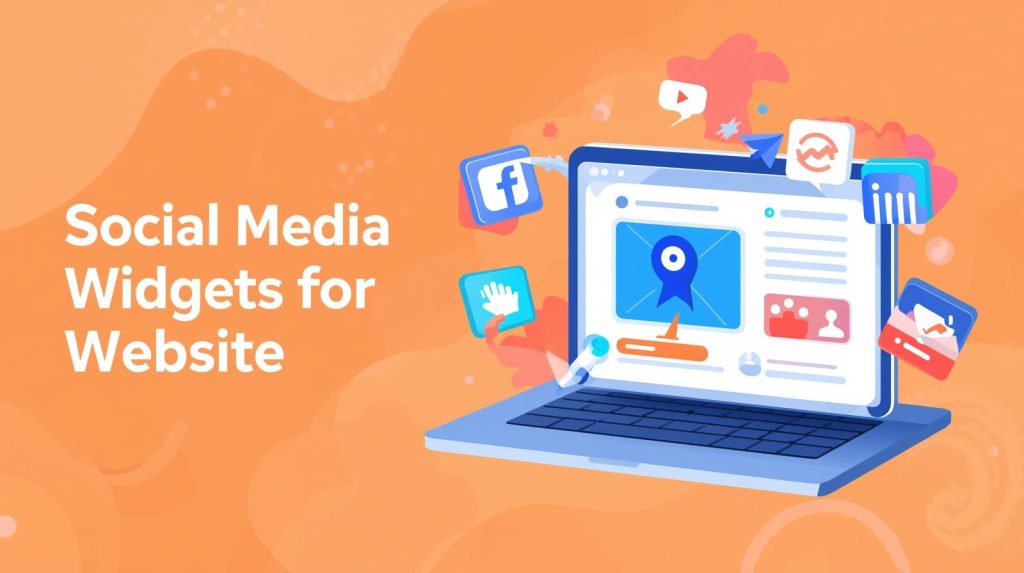In the digital-first world, a brand’s website is more than just an online presence—it’s a hub for customer engagement, storytelling, and conversions. But a static website can quickly feel outdated and less appealing to today’s audience, who are accustomed to consuming real-time, interactive content. That’s where social media widgets for websites come in.
By embedding a live social media feed on website, businesses can create dynamic, engaging, and authentic experiences that captivate visitors while building credibility. In this blog, we’ll explore what social media widgets are, their benefits, how they work, and why a social media aggregator is the key to maximizing their potential.
What Are Social Media Widgets for Websites?
A social media widget is a tool that allows you to embed content from social networks directly onto your website. These widgets can showcase posts, videos, images, hashtags, or even user-generated content (UGC) from platforms like Instagram, Facebook, TikTok, X (Twitter), LinkedIn, and YouTube.
The most effective widgets are powered by a social media aggregator—a tool that collects, curates, and displays content in real-time. This means that when your brand posts on social media, your website updates automatically with fresh content through a live social media feed on website.
Why Use Social Media Widgets on Your Website?
Adding social media feeds to your website is more than a design enhancement—it’s a marketing strategy. Here’s why they’re so impactful:
- Boost Engagement
Real-time posts keep visitors interacting with your site for longer, reducing bounce rates and increasing dwell time. - Showcase Authentic UGC
Displaying customer reviews, photos, and testimonials builds social proof and trust. - Keep Content Fresh Automatically
Instead of constantly updating your website manually, the feed refreshes itself whenever you post on social media. - Encourage Social Media Growth
When users see your vibrant feed, they’re more likely to follow your profiles and engage with your brand outside the website. - Strengthen Brand Identity
Integrating your social media feeds with your website ensures consistency across platforms.
Benefits of Adding a Live Social Media Feed on Website
Embedding a live social media feed on website gives you several competitive advantages:
- Engagement at First Sight: Your homepage immediately looks more dynamic and inviting.
- Event Amplification: Perfect for live events, campaigns, and conferences where real-time updates matter.
- Sales Influence: For e-commerce, customer UGC builds trust and nudges visitors toward purchases.
- SEO Benefits: Regularly updated pages can help improve search engine visibility.
How Social Media Aggregators Power Widgets
A social media aggregator is the engine behind most widgets. It collects posts from multiple social media channels and displays them on your site in a curated, customizable format.
Key Features of the Best Social Media Aggregator:
- Multi-platform Support – Pull content from Instagram, Facebook, TikTok, LinkedIn, and more.
- Customization Options – Match the widget to your website’s design.
- Real-time Updates – Ensure content always stays fresh.
- Moderation Tools – Filter out irrelevant or negative content.
- Responsive Design – Feeds look great on mobile, tablet, and desktop.
- Analytics – Track clicks, views, and engagement.
Popular options include Tagembed, Taggbox, EmbedSocial, and Walls.io. Each tool has its own strengths, but the goal is the same: make embedding a live social media feed on website simple and effective.
Ways to Use Social Media Widgets on Your Website
You can place social media widgets strategically depending on your goals. Here are some common placements and use cases:
- Homepage
Add a vibrant feed that instantly engages visitors when they land on your site. - Dedicated Social Wall Page
Create a community hub where all your social posts and user-generated content live in one place. - Product Pages
Showcase customer photos, reviews, or influencer collaborations to encourage purchases. - Blog Sections
Enhance written content with a dynamic, related feed to boost reader engagement. - Event Microsites
Display live tweets, Instagram stories, or TikTok videos during events to create buzz. - Footer or Sidebar
Use a smaller social media widget to keep your feeds visible on every page.
Step-by-Step: How to Add a Live Social Media Feed on Website
Here’s how to get started with embedding a social feed using a social media aggregator:
- Choose the Best Social Media Aggregator
Select a platform that supports the networks you want to feature. - Connect Social Media Accounts
Link your brand’s profiles or choose hashtag/mention-based feeds. - Curate Content
Filter posts to display only relevant, brand-appropriate content. - Customize Widget Design
Adjust layout, fonts, colors, and themes to match your site. - Generate Embed Code
Copy the HTML code provided by your aggregator. - Embed on Website
Paste the code into your website’s backend where you want the feed to appear. - Publish and Test
Check responsiveness on different devices and ensure the feed updates in real-time.
Best Practices for Social Media Widgets
To maximize results, keep these tips in mind:
- Keep it Relevant: Don’t overload your feed; show only content that reflects your brand.
- Use Moderation Tools: Control what appears to avoid spam or negative posts.
- Highlight UGC: Leverage customer-generated content for authenticity.
- Mobile Optimization: Ensure the feed looks great on smaller screens.
- Track Performance: Use analytics to measure engagement and conversions.
Final Thoughts
Social media widgets for websites are no longer optional—they’re essential for brands that want to create engaging, authentic, and conversion-driven experiences. Embedding a live social media feed on website ensures your pages stay fresh, builds trust with authentic content, and boosts engagement without requiring constant updates.
With the help of the best social media aggregator, you can customize, curate, and manage your feeds with ease. Whether you’re looking to showcase UGC, highlight brand campaigns, or amplify live events, a social media aggregator can help you turn static pages into interactive hubs of engagement.
If you haven’t yet tried integrating a live feed, now’s the time. Start small with a social media widget on your homepage or sidebar, and watch how it transforms your visitor experience.

